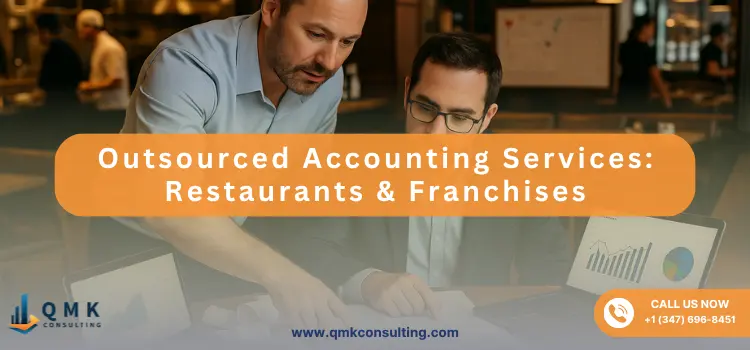
November 17, 2025 |Accounting & Bookkeeping


If you operate a multi-unit restaurant group or a growing franchise, the hardest part of finance isn’t tax season—it’s turning messy, multi-platform sales into clear decisions every week. That’s where outsourced accounting services pay for themselves. The right partner gives you a T+7 close, prime-cost discipline, and airtight POS→processor→bank reconciliations so you can open the next unit with confidence.
This guide explains what outsourced accounting is, why restaurants and franchise owners outsource, and how to outsource accounting services without losing visibility or control.
Think of it as a subscription finance team—from bookkeeper through controller (and, when needed, a virtual CFO)—built specifically for restaurant and franchise operations. A modern scope typically includes:
Restaurant accounting isn’t generic SMB bookkeeping. Delivery fees, comps, gift cards, sales tax by category, and royalties create seams a generalist misses. A niche team already knows the traps—and how to close cleanly every month.
Inside hires take time to recruit and train—and leave at the worst moment. With outsourcing, the close still lands T+7 because the process isn’t person-dependent.
When you price fully loaded salaries, software, and management time, a fixed retainer that includes tools + process + oversight is often cheaper—and easier to scale to a new unit.
Bankable financials and timely covenants are non-negotiable. Outsourced controller review delivers clean P&L/BS with schedules lenders accept on the first ask.
Information returns (W-2/1099 via IRIS), 1099-K tie-outs, and multi-state sales tax get handled inside a repeatable calendar—no February panic.
Why outsource accounting and tax preparation services?
Because the same clean ledger that powers operations makes tax season fast and predictable. When your books are “tax-ready” each month, year-end becomes a checklist—not a rescue mission.
List the must-haves: T+7 close, prime-cost page, 13-week cash forecast, unit P&Ls, sales-tax filings. Rank them by business impact.
Document every stream: POS, delivery apps, processors, payroll, bank/credit cards, gift cards/loyalty, franchise systems. Note payout timing, fee buckets, and current gaps.
Examples: close date (T+7), prime-cost band (≤ 60–65%), cash-forecast accuracy, AR/AP days, and lender-package readiness.
A specialist firm runs your day-to-day finance operations—bookkeeping, reconciliations, AP/AR, payroll tie-outs, sales tax—plus controller oversight and, if needed, a virtual CFO for planning, budgets, lender/board reporting.
To get speed, accuracy, compliance, and unit-economics expertise at a lower total cost than building the full in-house team—without risking a slow or inconsistent close.
Scope the deliverables (T+7 close, prime-cost page, cash forecast), map data sources, choose the right level (bookkeeper+controller vs controller+VCFO), and migrate with a 45-day plan and clear KPIs.
Because clean monthly books compress tax season, reduce errors, and keep cash and compliance in sync—so you can focus on throughput, guest experience, and growth.
QMK Consulting is a New York City-based accounting firm that supports business owners all around the country with a focus on restaurant and franchise accounting. We implement the processes operators rely on: daily POS-to-bank tie-outs, prime-cost control, sales-tax compliance, and a T+7 close—with a 13-week cash forecast you can actually manage.
Reinforce delivery and processor reconciliations with:
Keep year-end smooth with e-file rules:
Align payroll and credits:
Curious what outsourcing could do for your margins and cash? Our experts provide you free profit & cash flow analysis for free. You’ll leave with a 30-day close plan, a sample T+7 reporting pack, and a first pass at your 13-week cash forecast—tuned to your menu mix, delivery stack, and growth plan.